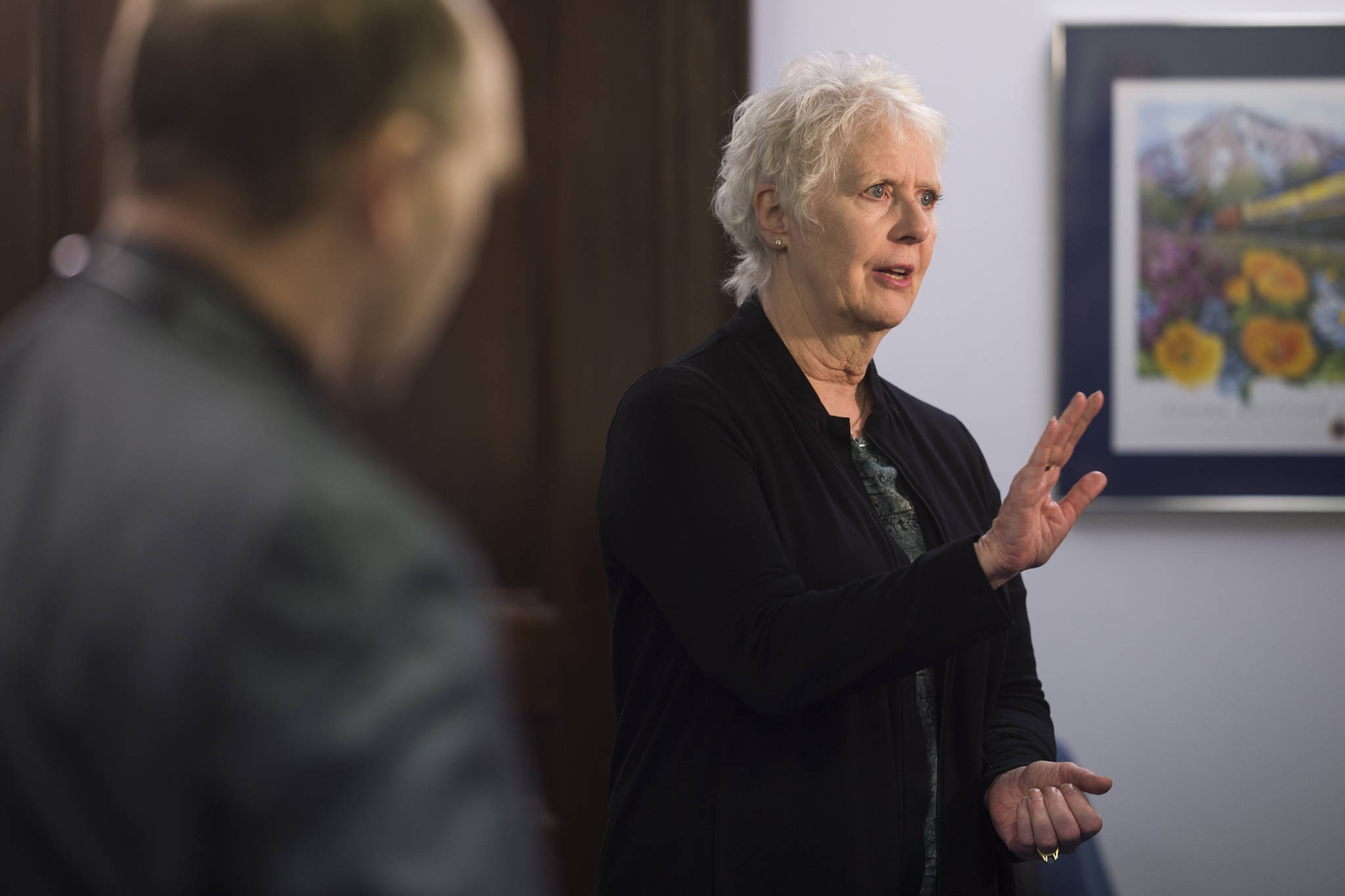A surprise nomination for Rep. Gary Knopp, R-Kenai, to be Speaker of the House spoiled what seemed like an imminent victory for House Republicans on Tuesday morning.
In the end, both House speaker nominations failed with Knopp and Rep. Dave Talerico, R-Healy, each garnering 20-20 splits from the House.
Coming into the 29th day of session, House Republicans expected Talerico to be nominated Speaker of the House. This was due to a news report in the Anchorage Daily News, published Monday, in which Knopp said he would vote for a Republican speaker. Knopp would have been the vote to carry a Republican majority of 21 representatives.
Those hopes soured Tuesday when Rep. Louise Stutes, R-Kodiak, nominated Knopp, splitting the vote with Talerico.
Leading up to the vote, Rep. Dan Ortiz of Ketchikan, called a Knopp “a tireless champion for all Alaskans” and said it would be important the majority “work effectively regardless of party affiliation.” Ortiz said that’s important because he has no party affiliation.
Rep. David Eastman, R-Wasilla, then asked if Knopp would explain this unexpected nomination and referenced the news report.
“I never said who I would support,” Knopp said. “I am in support of a Republican nominee, myself.”
Sharon Jackson, R-Chugiak, called the nomination “a very interesting occurrence.”
The House will continue its record-setting run Wednesday, with no House speaker and no organization. It cannot conduct business. It will mark the 30th day of session. The previous record was 21 days of disorder set back in 1981.
[Leaderless House on track to break 37-year record]
Knopp also said Republicans missed out on a chance to elect a GOP speaker.
“You could say that the Republicans voted against one of their own today and could’ve had a Republican-led caucus,” Knopp said. “They like to blame me for being 21 and not supporting the caucus. They had the same opportunity today. They chose not to take it.” By calling himself “21” Knopp is referring to the fact that if he were to vote for Talerico, the GOP would have a majority of 21 representatives. Without him, the House Republican caucus remains at 20 members.
Some in the Capitol have speculated the House would form a majority after the budget is released on Wednesday, but Knopp disagrees.
“I don’t think it will galvanize or polarize one side or the other,” Knopp said of the budget. “You’re not going to go caucus with anybody based on a budget item. You may agree with them on the one item and disagree with them on the next.”
He was then asked what it would take for a House majority to form and elect a speaker.
“There’s a lot of people just adamant about positions of power. Some are just adamant about being down the party line, and it’s more about the party than public policy,” Knopp said. “I think when people start agreeing about that, it’s about what’s in the best interest regardless of where they sit in the organization. I think you’ll finally get there when people start realizing this needs to be about what’s the greater good and not about the party.”
Party lines
There are 40 members in the House of Representatives. The party breakdown is 23 Republicans 16 Democrats, and one non-partisan in Ortiz.
Knopp has remained adamant about the need for a strong bipartisan majority and said he was “not siding with anybody.” Two other Republicans, Stutes and Rep. Gabrielle LeDoux, R-Anchorage, been caucusing with the House Coalition. That’s three Republicans who are not caucusing with the party, hence the 20-20 split on Tuesday.
Knopp was asked if representatives are apprehensive about crossing party lines.
“There’s definitely fear of party reprisals. Especially for some of the freshman,” Knopp said. “Especially in light of what the party did last year. It was a massive divider. It divided us all across the state. The party did a lot of damage.”
Knopp is referring to the 2018 election. Tuckerman Babcock, who was then-Alaska Republican Party chair and is now chief of staff to Gov. Mike Dunleavy, targeted three Republicans for caucusing across party lines in the House Majority Coalition during the 30th Legislative session. Republicans Stutes, LeDoux and former Rep. Paul Seaton of Homer were a part of the House Majority Coaltion. As a result, Babcock tried to block the from appearing on the ballot on Republicans, but the Alaska Supreme Court struck this down. Babcock later wrote an open letter asking these three representatives to run as Democrats or other political affiliation.
“While you have every right to abandon your old team and align with another political party, your old team has every right to abandon you and align with another candidate,” Babcock wrote in an open letter.
In the end, Stutes and LeDoux ran as Republicans and were able to retain their seats. Seaton ran as a Democrat in Homer and lost to Rep. Sarah Vance, a Homer Republican.
Rep. Chuck Kopp, R-Anchorage, nominated Talerico to be Speaker of the House.
• Contact reporter Kevin Baird at 523-2258. Follow him on Twitter at @alaska_kev.

